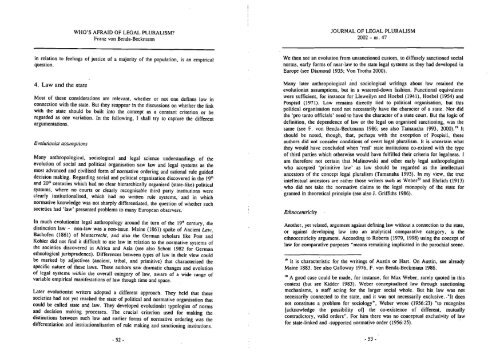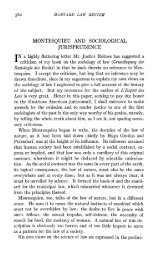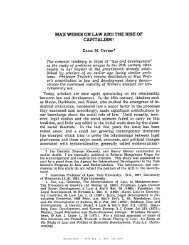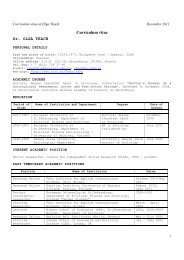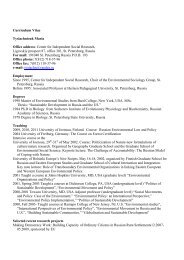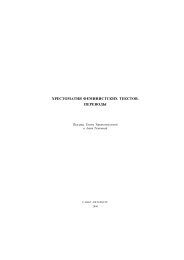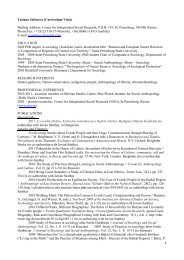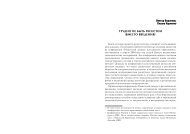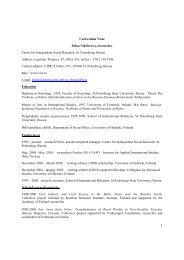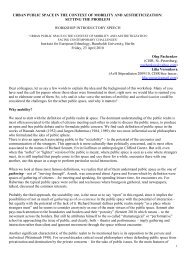WHO'S AFRAID OF LEGAL PLURALlSM?Franz von Benda-BeckmannJOURNAL OF LEGAL PLURALlSM2002 - nr. 47in relation to feelings <strong>of</strong> justice <strong>of</strong> a majority <strong>of</strong> the population, is an empíricalquestion.4. Law and {he stateMost <strong>of</strong> these consíderalions are relevant, whelher or nOl one defines law inconneclion with the slale. But they reappear in the discussions on whether lhe linkwith the slale should be buill into the concept as a conslant crilerion or beregarded as one variation. In the following, J shall try lo capture the differemargumemations.EvoLuTionis/ assumpTionsMany anthropological, soeiological and <strong>legal</strong> science underslandings <strong>of</strong> theevolution <strong>of</strong> social and political organisalion saw law and <strong>legal</strong> systems as themost advanced and civilised form <strong>of</strong> normative ordering and ralional rule guideddecision making. Regarding social and political organisation discovered in the 19'hand 20'h centuries which had no clear hierarchically organised (state-like) politicalsystems, where no courts or clearly recognisable lhird party instilutions wereclearly institutionalised, which had no wrillen rule syslems,' and in whichnormative knowledge was not sharply differentiated, lhe queslion <strong>of</strong> whether suchsocieties had 'Iaw' presented problems to many European observers.In much evolulionisl <strong>legal</strong> anthropology around the turn <strong>of</strong> the 19,h century, thedislinction law - non-Iaw was a non-issue. Maine (1861) spoke <strong>of</strong> Ancien! Law,Bach<strong>of</strong>en (1861) <strong>of</strong> MutterrechT,and also the German scholars like POSl andKohler did nol find it difficult lo use law in relation lO lhe normalive systems <strong>of</strong>lhe socielies discovered in Afriea and Asia (see also Schott 1982 for Germanelhnological jurisprudence). Differences belween types <strong>of</strong> law in their view couldbe marked by adjectives (ancienl, tribal, and primilive) that characterised lhespecific nalure <strong>of</strong> lhese laws. These aUlhors saw dramatic changes and evolution<strong>of</strong> <strong>legal</strong> systems within the overall category <strong>of</strong> law, aware <strong>of</strong> a wide range <strong>of</strong>variable empirical manifeslalions <strong>of</strong> law though time and space.Later evolutionist wrilers adopled a different approach. They held lhat thesesocieties had nol yet reached the state <strong>of</strong> political and normative organisation thalcould be called state anq law. They developed evolulionist typologies <strong>of</strong> normsand decision making processes. The crucial crilerion used for making thedislinctions between such law and earlier forms <strong>of</strong> norrnalive ordering was lhedifferemiation and instilutionalisalion <strong>of</strong> rule making and sanctioning inslilUtions.- 52 We then see an evolution from unsanctioned custom, to diffuscly sanctioned socialnorms, early forms <strong>of</strong> near-law to the state <strong>legal</strong> systems as they had developed inEurope (see Diamond 1935; Von Trotha 2000).Many later anthropological ~nd sociological wntmgs about law retained theevolutionist assumptions, but in a watered·down fashion. Functional equivalentswere sufficient, for instance for L1ewellyn and Hoebel (1941), Hoebel (1954) andPospisil (1971). Law remains directly tied to political organisation, but th.ispolitical organisalion need not necessarily have tlle character <strong>of</strong> a state. No~ dldthe 'pro tanto <strong>of</strong>ficials' need to have the character <strong>of</strong> a state court. BUI the loglc <strong>of</strong>definilion,lhe dependence <strong>of</strong> law or the <strong>legal</strong> on organised sanctioning, was lhe~same (see F. von Benda-Beckmann 1986; see also Tamanaha 1993, 2000). 11should be noted, though, thal, perhaps with the exception <strong>of</strong> Pospisil, lheseauthors did not consider eonditions <strong>of</strong> overl <strong>legal</strong> <strong>pluralism</strong>. It is uncertain whatlhey would have concluded when 'real' stale instilutions co-existed with the type<strong>of</strong> third parties whicll otherwise would have fulfilled lheir crileria for <strong>legal</strong>ness. Jam therefore not eertain lhat Malinowski and olher early <strong>legal</strong> anthropologistswho accepte'd 'primitive law' as law should be regarded as the intellectualanceslors <strong>of</strong> the concepl <strong>legal</strong> <strong>pluralism</strong> (Tamanaha 1993). In my view, the lrueintelleclual ancestors are ralher lhose wrilers such as Weber 1U and Ehrlich (1913)who did nol take lhe normative claims to lhe <strong>legal</strong> monopoly <strong>of</strong> the state forgranted in theorelieal principie (see also J. Griffilhs 1986).EthnocentricityAnolher, yel relaled, argument againsl defining law withoul a conneclion to lhe state,or against developing law into an analytical comparative calegory, is theelhnocentricilY argumento According to Roberts (1979, 1998) using the concept <strong>of</strong>law for comparative purposes "means remaining implicated in the parochial scene.19 11 is characteristic for lhe writings <strong>of</strong> Austin or Hart. On Austin, see alreadyMaine 1883. See also Galloway 1976, F. von Benda-Beckmarm 1986.lO A good case eould be made, for instance, for Max Weber, rarely quoted in thisCOnlext (bUI see Kidder 1983). Weber conceptualised law through sanctioningrnechanisms, a slaff acting for the larger social whole. But his law was notnecessarily connected to the state, and it was not necessarily exclusive.."lt doesnot constilule a problem for sociology", Weber wrole (1956:23) "to recognize[acknowledge the possibility <strong>of</strong>] the co-existence <strong>of</strong> differem, mutuallycontradiclory, valid orders". For him there was no conceptual exclusivity <strong>of</strong> l~wfor slate-Iínked and -supported normalive order (1956:25).- 53
WHO'S AFRAID OF LEGAL PLURALlSM?Franz von Benda-BeckmannJOURNAL OF LEGAL PLURALlSM2002 - nr. 47For so much <strong>of</strong> our sense <strong>of</strong> what law 'is', is bound up with, and has been createdthrough, law's association with a particular history - early on, the emergence <strong>of</strong>secular governmenl in Europe; laler, lhe managemenl <strong>of</strong> colonial e"pansion"(1998: 98). By using the word law for normative orders differenl from state law,Roberts argues, one would impose the weSlern Eurocenlric concept <strong>of</strong> law on lhem,jarnrning other peoples' normalive ideas/systems into westem categories and therebydislorting lhem. I do nol lhink thal this is a convincing argumenl.lt certainly is the case tha.t many such ethnocentric imerpretations and distortions<strong>of</strong> other peoples' <strong>legal</strong> syslem, 01' <strong>of</strong> single inslitutions sueh as marriage 01'properly relationships, have occurred. Much <strong>of</strong> the lilerature in the ]970s hasdeconslructed such transformalions, going so far as to speak <strong>of</strong> a 'creation' <strong>of</strong>cuslomary Jaws. In more sophisticaled analyses, lhis has led researchers lOdislinguish between the kinds <strong>of</strong> law interpreted and used in local settings and forinslanee in colonial courts, drawing attention to the conte"tualily <strong>of</strong> law insociety.21 lt musl also be admitted that in naming concepts such as law, one cannotescape completely from ethnocentric influences. Sorne bias may be inevilable (seeGoldschmidl 1966: 93; F. von Benda-Beckmann 1979: 17; Giddens 1984: 284).Vet it would also be naive lo maintain lhat social scientists could not dislaneethemselves from lhe meanings which have been developed in their own society,and lhat lhey would necessarily be forced to adopt (01' keep running after) thosedefinilions provided by powerful 01' hegemonic agems. Why should one argue likethis at all? Why should one treat law so very differently from other categories weuse for eomparative purposes: religion, politics, marriage, and property? Why isit so impossible 10 lake distance from lhe parochial underslanding <strong>of</strong> law anddevelop it ¡mo a wider category usefui for looking at differences and similaritiesbetween dífferem historieal manifestations <strong>of</strong> law? Isn't it Roberts himself wh<strong>of</strong>irst imprisons the word law in lhis parochial, Eurocentric and unhistorical way,so much that it would not even encompass all historical manifestations <strong>of</strong> 'statelaw'. and then poinls lhe finger at this ethnocentrie prison?22 Apparently, such21 Clammer 1973, Chanock 1985, Snyder 1981. For Minangkabau, see F. vonBenda-Beckmann 1979, K. von Benda-Beckmann 1982, 1984. See alsoWoodman's distinction belween lawyers' and sociologislS' customary ]aw (1987).Long before lhese discussions emerged in Anglo-American <strong>legal</strong> anthropology,the point had been made by the Dutch scholars <strong>of</strong> adat law in Indonesia whodistinguished between "adat folk law" and "Iawyers adat law". Van Vollenhoven1909, F.O. Holleman 1938. See also J.F. Holleman 1981.22 Snyder's critique is similar. Comar<strong>of</strong>f and Roberts (1981) assume that anyconceplion <strong>of</strong> Jaw is necessarily based, ultimately, on concepts <strong>of</strong> western <strong>legal</strong>theory (Snyder 1993:8). Presuming lhal any conception <strong>of</strong> law is inevitablyauthors cannot, or do not wam to escape that prison by distinguishing a concept asa sciemific device characterized by properties from descriptions <strong>of</strong> cultural,social, polilical phenomena. As 1 have written earlier (1997), Chis is a refusal totake analytical distance from the dominant <strong>legal</strong> ideology in which law and stale aredirectly connecled concepnially.Moreover, slatemenls condemning the use <strong>of</strong> law and <strong>legal</strong> <strong>pluralism</strong> on thesegrounds are frequently apodietieally and unsupported by an analysis <strong>of</strong> the work<strong>of</strong> scholars who allegedly, by using law, incorporate ethnoeentric underslandingsinto lheir wrilings. It is by no means that case that researehers during the pasl 30years would usually have lranslaled certain characleristics <strong>of</strong> 'western laws' such as their ideologies <strong>of</strong> court decision making (rules determine outcomes), thefunctional differentiation <strong>of</strong> adjudication, the differentiation belween Jaw andpolitics - imo their reading <strong>of</strong> normative orders in the non-western world.Proponents <strong>of</strong> a wider analyiical concept <strong>of</strong> law e"plieitly formulate the properties<strong>of</strong> the coneept in a way that does not inelude ethnoeentric British, Minangkabau 01'Barotse elemems ¡mo the definilion <strong>of</strong> law but sees them as varialions. In fact, itis only with the help <strong>of</strong> analytical concepts that alIow us to pereeive, analyse andattempt to e"plain the similarities and differences between British, Minangkabau01' Barotse normative orders. But sueh attempts to develop comparalive analyticalframeworks are usually not discussed at all. Aecusing them <strong>of</strong> ethnocenlricity inmy view is a case <strong>of</strong> projeclion <strong>of</strong> lhe writers' own biases, for they do exactlywhal they aceuse olhers <strong>of</strong>. They impose their ethnocentric <strong>legal</strong> ideology on otherpeoples' normative orders and e"elude anything from being '<strong>legal</strong>' that does notconform to lhat ideology. 23The meiting down 01 difference argumentRelated to lhe elhnocentricilY argument is the <strong>of</strong>ten heard argument, thal byembracing the nolion <strong>of</strong> <strong>legal</strong> <strong>pluralism</strong> !he eoncept <strong>of</strong> law would become too wideand could comprise "anything" (Merey 1988), and that crucial differences betweenWestern, they rightly erilicise the misapplication <strong>of</strong> Western <strong>legal</strong> theory butunnecessarily é",c1ude the possibílity <strong>of</strong> a more adequate comparative sociology <strong>of</strong>law (1983:9).23 Another weakness <strong>of</strong> lhis Hne <strong>of</strong> thought is that it is based upan 'false comparison'(Van Velsen 1969). The measuring stick for description and analysis is taken fromethnoeenlric <strong>legal</strong> ideology. This means that such a concept would not even be sufficientfor a description and analysis <strong>of</strong> the functioning <strong>legal</strong> system from which lheideological descripiive elements are taken.- 54 - - 55


